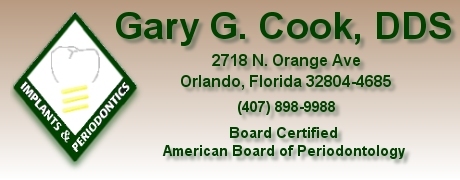


|
Periodontal Disease Periodontal disease is a bacterial infection in the mouth that causes bleeding gums, loss of bone support for the teeth, and halitosis (bad breath). This disease, if left untreated, is generally progressive, leading to further damage and possible loss of teeth. Frequently, people are not aware that they have periodontal disease because the infection usually does not cause pain until it is too late to save the teeth. The bleeding and pus caused by the infection is sometimes not evident, since it can be deep in the crevice between the teeth and the gums, beyond where the toothbrush and floss can reach. Periodontal disease is a group of inflammatory diseases in which bacteria and their by-products are the principle etiological agents. There is growing evidence that poor dental health, especially the presence of periodontal disease, increases the risk of occurrence of coronary heart disease. These studies confirm the observation that heart disease is the most commonly found systemic condition in patients with periodontal disease. Controlling periodontal disease requires a coordinated effort between you, the general dentist, the periodontist and the dental staff. The dentists and their staff must help you to understand the disease process and offer the tools and training to control the disease. You must accept the daily responsibility to effectively clean your mouth. Brushing alone is not sufficient to control periodontal disease. Flossing is also an essential part of an effective oral hygiene regimen and other specialized tools may be required based on individual needs. When the disease has destroyed the tissues in the mouth to a point beyond where a routine dental cleaning or your cleaning efforts are able to reach, periodontal surgery is indicated. This procedure will allow Dr. Cook access to the problem areas to eliminate the infection, clean the tartar (calculus) off the root surfaces, and contour the tissues properly so that you will have access to clean your mouth effectively after treatment. Occasionally, teeth that are very severely affected by periodontal disease need to be extracted. Normally this will be done at the time of surgery. Local anesthesia ("Novocain") is used to numb the tissues and render the surgical procedure virtually painless. We want you to be comfortable. Stitches are used to close the gum tissue following surgery and the area is usually covered with a periodontal dressing (a pliable pink material). These will be removed at the postoperative visit approximately one week later. As a result of the techniques and medications used, most patients will experience minimal, if any, pain, bleeding or swelling. Following treatment, there will most likely be some exposed tooth root surfaces, which may be cold sensitive for a number of weeks or months. A desensitizing toothpaste (for example, Sensodyne) can help to reduce this sensitivity. You may also experience open spaces between the teeth where food impaction can occur. This results when periodontal disease has destroyed some of the bone support for the teeth. If these spaces happen to be in between the front teeth, they may be visible when you smile. A cone-shaped brush (Proxabrush) is a very useful oral hygiene tool to cleanse these interproximal spaces. An end-tufted brush may also be given to you for difficult to reach areas. Several months after your initial phase of treatment has been completed, we will see you again for a re-evaluation and maintenance visit. At that time we will do another charting to ensure that your mouth is healthy. We will also clean and polish all your teeth at this maintenance visit. You will then be ready to return to your general dentist for any needed restorative work (crowns, fillings, partial dentures, etc.). Maintenance visits with a hygienist will normally alternate between our office and your general dentist's office. The long-term success of treatment requires your cooperation and performance of effective plaque control (home care) on a daily basis and periodic periodontal maintenance visits at a dental office after the surgical treatment is completed. This is because most periodontal disease is chronic in nature, requiring continuing care to keep it under control. Because of varying susceptibilities that people have to this disease and differing levels of oral hygiene practiced by patients, no guarantee, warranty or assurance can be given that these procedures will be successful to your complete satisfaction. Postoperative complications, which include bleeding, swelling, infection or numbness of the tissues do happen, but are rare. If no treatment is rendered, your present periodontal condition will probably worsen in time, which may result in tooth loss. Our goal is to help you return your mouth to a state of health, comfort and function in an atmosphere of caring and understanding. Please ask us about any of your concerns regarding these procedures.
|
Last update: 07/11/09